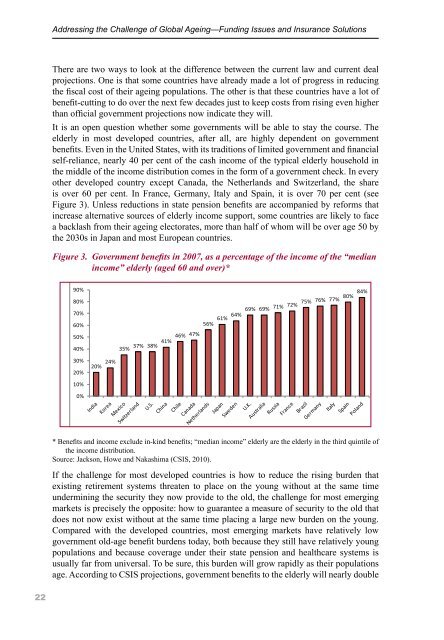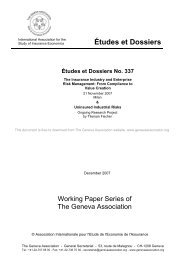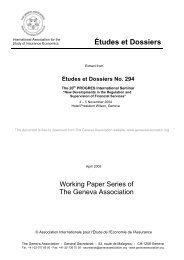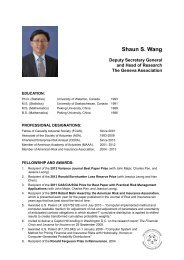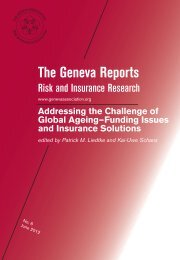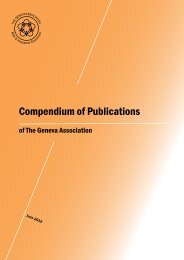Addressing the Challenge of Global Ageing—Funding Issues
Addressing the Challenge of Global Ageing—Funding Issues
Addressing the Challenge of Global Ageing—Funding Issues
Create successful ePaper yourself
Turn your PDF publications into a flip-book with our unique Google optimized e-Paper software.
22<br />
<strong>Addressing</strong> <strong>the</strong> <strong>Challenge</strong> <strong>of</strong> <strong>Global</strong> Ageing—Funding <strong>Issues</strong> and Insurance Solutions<br />
There are two ways to look at <strong>the</strong> difference between <strong>the</strong> current law and current deal<br />
projections. One is that some countries have already made a lot <strong>of</strong> progress in reducing<br />
<strong>the</strong> fiscal cost <strong>of</strong> <strong>the</strong>ir ageing populations. The o<strong>the</strong>r is that <strong>the</strong>se countries have a lot <strong>of</strong><br />
benefit-cutting to do over <strong>the</strong> next few decades just to keep costs from rising even higher<br />
than <strong>of</strong>ficial government projections now indicate <strong>the</strong>y will.<br />
It is an open question whe<strong>the</strong>r some governments will be able to stay <strong>the</strong> course. The<br />
elderly in most developed countries, after all, are highly dependent on government<br />
benefits. Even in <strong>the</strong> United States, with its traditions <strong>of</strong> limited government and financial<br />
self-reliance, nearly 40 per cent <strong>of</strong> <strong>the</strong> cash income <strong>of</strong> <strong>the</strong> typical elderly household in<br />
<strong>the</strong> middle <strong>of</strong> <strong>the</strong> income distribution comes in <strong>the</strong> form <strong>of</strong> a government check. In every<br />
o<strong>the</strong>r developed country except Canada, <strong>the</strong> Ne<strong>the</strong>rlands and Switzerland, <strong>the</strong> share<br />
is over 60 per cent. In France, Germany, Italy and Spain, it is over 70 per cent (see<br />
Figure 3). Unless reductions in state pension benefits are accompanied by reforms that<br />
increase alternative sources <strong>of</strong> elderly income support, some countries are likely to face<br />
a backlash from <strong>the</strong>ir ageing electorates, more than half <strong>of</strong> whom will be over age 50 by<br />
<strong>the</strong> 2030s in Japan and most European countries.<br />
Figure 3. Government benefits in 2007, as a percentage <strong>of</strong> <strong>the</strong> income <strong>of</strong> <strong>the</strong> “median<br />
Figure income” 3: Government elderly Benefits (aged 60 in 2007, and as over)* a Percent <strong>of</strong> <strong>the</strong> Income <strong>of</strong> <strong>the</strong> "Median Income"<br />
90%<br />
80%<br />
70%<br />
60%<br />
50%<br />
40%<br />
30%<br />
20%<br />
10%<br />
0%<br />
Elderly (Aged 60 and Over)*<br />
20% 24%<br />
84%<br />
80%<br />
75% 76% 77%<br />
69% 69% 71% 72%<br />
64%<br />
61%<br />
56%<br />
46% 47%<br />
41%<br />
35%<br />
37% 38%<br />
* Benefits and income exclude in-kind benefits; "median income" elderly are <strong>the</strong> elderly in <strong>the</strong> third quintile <strong>of</strong> <strong>the</strong> income<br />
distribution.<br />
* Benefits Source: and income <strong>Global</strong> Aging exclude Preparedness in-kind Index<br />
benefits; “median income” elderly are <strong>the</strong> elderly in <strong>the</strong> third quintile <strong>of</strong><br />
<strong>the</strong> income distribution.<br />
Source: Jackson, Howe and Nakashima (CSIS, 2010).<br />
If <strong>the</strong> challenge for most developed countries is how to reduce <strong>the</strong> rising burden that<br />
existing retirement systems threaten to place on <strong>the</strong> young without at <strong>the</strong> same time<br />
undermining <strong>the</strong> security <strong>the</strong>y now provide to <strong>the</strong> old, <strong>the</strong> challenge for most emerging<br />
markets is precisely <strong>the</strong> opposite: how to guarantee a measure <strong>of</strong> security to <strong>the</strong> old that<br />
does not now exist without at <strong>the</strong> same time placing a large new burden on <strong>the</strong> young.<br />
Compared with <strong>the</strong> developed countries, most emerging markets have relatively low<br />
government old-age benefit burdens today, both because <strong>the</strong>y still have relatively young<br />
populations and because coverage under <strong>the</strong>ir state pension and healthcare systems is<br />
usually far from universal. To be sure, this burden will grow rapidly as <strong>the</strong>ir populations<br />
age. According to CSIS projections, government benefits to <strong>the</strong> elderly will nearly double


